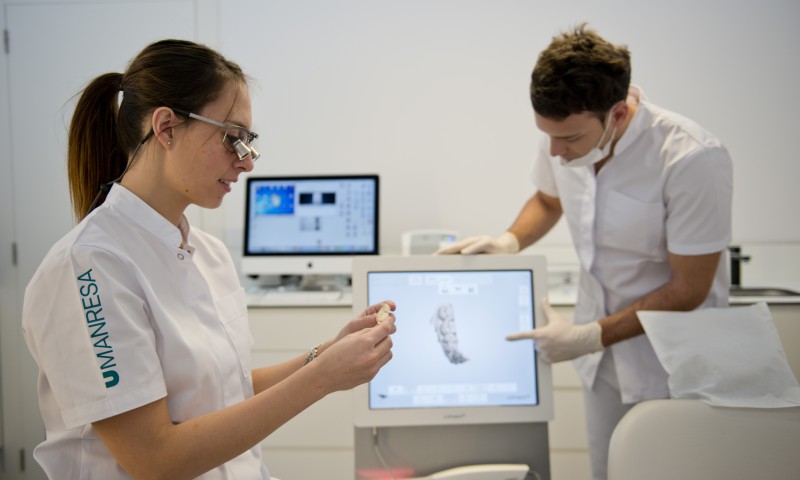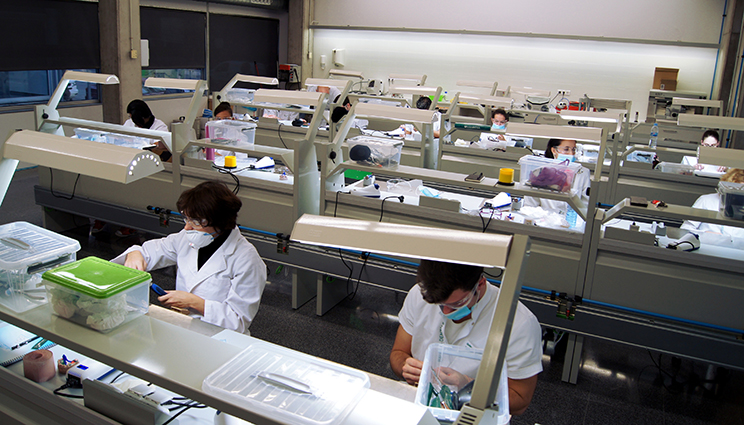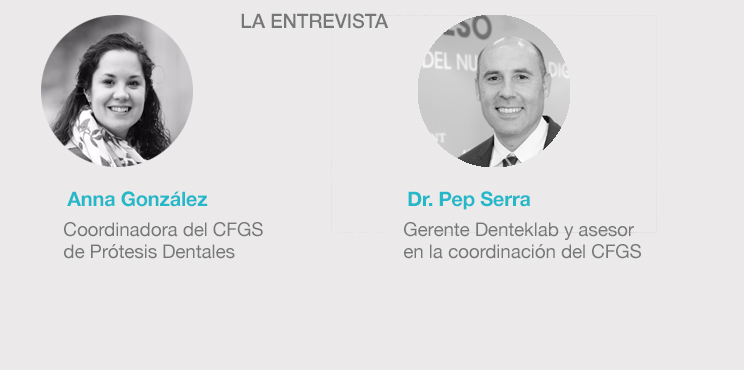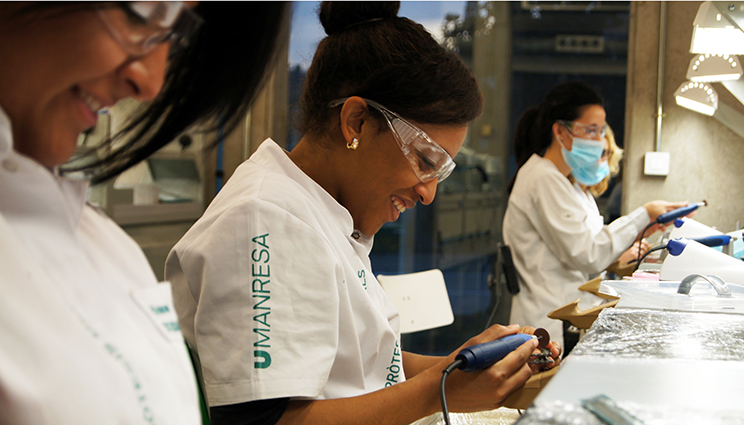

Training is a key factor in the dentistry and dental prosthetics sector, as it is one of the mainstays that make advancing towards the new digital paradigm possible. In light of this, AVINENT Implant System is committed to top-quality training as one of the foundations for tackling the present and the future, as demonstrated by its longstanding close relationship with the Fundació Universitària del Bages (FUB), which continues to bear fruit. One example is the partnership agreement that AVINENT and the FUB signed a year ago to ensure the quality and success of the Program to Train as a Senior Technician in Dental Prosthetics.
This training program was run for the first time during the last academic year and was the only one in its field in Catalonia to be structured as a cooperative course, a teaching method that enables students to combine study at the Manresa Campus of the Universitat de Vic – Universitat Central de Catalunya with work experience in a number of companies in the sector, among them AVINENT.
As a result, students emerge fully prepared for future employment. «It’s a great idea, since it enables you to train on two fronts», says Carles Serra, who signed up for the program to «address my future», and he says that in his first year «I learned a lot in both theory and practice». This combination is also described as «beneficial» by his fellow student Clàudia Martínez, who says «it enables you to learn about new working methods and to improve your skills in performing tasks in the laboratory».

Clàudia describes in detail the process that led her to choose the course: «Before signing up, I attended various open-door sessions at numerous centers, and one of the things that made me choose the FUB, besides the fact that the premises were new, was that I was very interested in the possibility of doing a cooperative course in the second year, and in the contribution of the new technologies, since it was one of the centers committed to teaching computer-aided design».
«The first year was very good», says Rosa Gaya, a student on the program who works at AVINENT. She adds «I’ve learned a lot and it has helped with things to do with my job that I was unaware of». Rosa is looking forward to the second year of the program, which she states «will be more digital», which «I am extremely interested in, above all in relation to my job, since AVINENT is totally digital and I want to know more about what I do on a day to day basis».
Clàudia Martínez, who is hoping «to be able to do the cooperative course in the best possible manner», believes that, at a personal level, during the second year «it will be a matter of seeing what we like best and what we work well at, whether it is the fixed or the removable prosthesis». Serra is expecting to «see and focus the theoretical foundations I learned during the first year in a professional manner» and is keen to «begin working with the CAD/CAM system and other new technologies».

How did the Program to Train as a Senior Technician (PTST) in Dental Prosthetics come about?
Anna González: When the FUB merged with the Universitat de Vic, forming the UVIC – Universitat Central de Catalunya, we knew they were already doing professional training there and we wanted to add to it. With regard to this particular course, there was a gap and tremendous demand in the sector.
Dr. Pep Serra: The geographical issue was a very important aspect. I don’t know if the FUB would have set up this training program if companies like AVINENT and Denteklab had not been nearby. A small cluster in the dental prosthetics world is being created, and this quality training tool is another added value in Bages county.
What was the initial goal of the training program?
PS: To turn ourselves into a European center of excellence in quality training in dental prosthetics.
AG: We are in an environment that has been growing considerably at a technological level in recent years, and we have climbed aboard that train and have no intention of getting off.
PS: Within the world of dental prosthetics, there is a paradigm shift, not just here but in the entire dental sector. We are now well into the digital era and yet people are studying the way things were done in the 20th century, not the 21st. We have committed ourselves to this training program to change and revolutionize training in the new digital approach.
What is your assessment of the first year?
AG: Overall it was very positive. The teachers did a good job and we feel we benefited from the support offered by AVINENT, Dentek and our other partner companies. It’s a process that we will have to build gradually.
PS: We have to see it as a total success, that’s the truth. We have to acknowledge that the course started a year ahead of time and everything was done in a timespan that seemed impossible. The students responded excellently. They made what was almost a blind bet because they enrolled without being very sure what the course was, because they had seen nothing, and they realize that they made the right decision.

AVINENT Implant System is supporting the program. What is their role?
PS: Their role is to provide support in this entire technological change which, at the outset and given the sector concerned, called for a significant investment. Finding a partner that would help to make that investment, to forge alliances with strategic partners, as AVINENT has done, is very important. It is a fundamental mainstay of the project.
AG: A year ago, we signed a partnership agreement with AVINENT that is proving to be a win-win. We in the FUB are trying to give back everything we receive, and so if there is a need for premises that meet a series of technical requirements, like those we now have, we let them have them. Last year, they did their own training with professionals from across Europe in our premises on two or three occasions. Hence, the win-win situation.
PS: And that’s just the beginning. The relationship between the FUB and AVINENT will grow.
AG: Yes. We have paved the way and lots more things will come along; we’re constantly making new contributions. AVINENT has some very impressive departments that we are constantly in touch with, and we’re opening up new paths. It is not by any means a fixed agreement.
Why did you opt for a cooperative course?
AG: This was based on the experience of the UVIC. They had already opted for this type of training and had good results. In addition, it’s a sector where there is a demand for well-trained professionals and companies were very keen to participate. So we said “if everyone is so keen, let’s get it done.” It’s a type of training that offers good job prospects and students are very enthusiastic about doing it. Not everyone on the program does work experience because there are criteria and the number of places is limited. The criteria are above all academic and to do with timings, mobility… people who are very interested work hard to get one of these places.
PS: We are hoping to attain the maximum number of work-experience places. Consolidating 30% of these would be a success.
What distinguishes this program from those taught elsewhere?
PS: There are three main differences. Firstly, the university environment. This is a university and students are treated as university students. They can use the excellent facilities at the FUB and get to know students in other disciplines. Secondly, we were the first to be able to offer this cooperative course in Catalonia. Thirdly, and most importantly, there is the technology. And it is here that AVINENT’s support plays a crucial part, as it would have been much more complicated without it.
At the end of the program, are students trained and ready for the new digital era?
PS: Even though we have to confine ourselves to the program laid down by the education authorities, and which is designed for a technician working in the 19th century, we do everything we can to ready students for the digital era when they leave. They will have used analog tools, but they will also have basic skills and experience in digital tools.
We can do this thanks to the support of the industry and, in this case, of AVINENT.
AG: The syllabuses drawn up by the authorities are out of step with the dynamic in the sector.
PS: Exactly. We must not leave out the basics, the analog part, etc. But we have to look ahead to the future. Here we have ten software licenses that enable students to digitally design what was once done in an analog manner. I think there are few centers that have this equipment: a state-of-the-art scanner, intraoral scanners, and the AVINENT or Dentek milling service, which can give you a workflow that is very difficult to find elsewhere.
AG: And work experience on a cooperative course is the ideal complement to all that.
How would you describe AVINENT’s commitment to training?
PS: For companies like AVINENT or Dentek, which are looking ahead to the future and have a long-term vision, and which are very localized geographically, training is fundamental. Firstly, due to the local issue, in order to have people in the area who can give you reciprocal support, you have to train them. And secondly, because in this field, the paradigm shift forces us to reinvent ourselves all the time, and training is a tool to keep us abreast of the latest developments in our job. A commitment to training is fundamental in a company that has a vision of the future. And if it can be done with the collaboration of an institution like the FUB, it brings all the elements together in a virtuous circle.